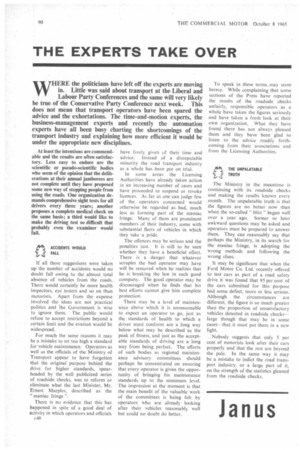THE EXPERTS TAKE OVER
Page 92

If you've noticed an error in this article please click here to report it so we can fix it.
WHERE the politicians have left off the experts are moving in. Little was said about transport at the Liberal and Labour Party Conferences and the same will very likely be true of the Conservative Party Conference next week. This does not mean that transport operators have been spared the advice and the exhortations. The time-and-motion experts, the business-management experts and recently the automation experts have all been busy charting the shortcomings of the transport industry and explaining how more efficient it would be under the appropriate new disciplines.
At least the intentions are commendable and the results are often satisfactory. Less easy to endure are the scientific or pseudo-scientific bodies who seem of the opinion that the deliberations at their annual jamborees are not complete until they have proposed some new way of stopping people from using the roads. One organization demands comprehensive sight tests for all drivers every three years; another proposes a complete medical check on the same basis; a third would like to make the driving test so difficult that probably even the examiner would fail.
ACCIDENTS WOULD FALL
If all these suggestions were taken up the number of accidents would no doubt fall owing to the almost total absence of vehicles from the roads. There would certainly be more health inspectors, eye testers and so on than motorists. Apart from the expense involved the ideas are not practical politics and the Government is wise to ignore them. The public would refuse to accept restrictions beyond a certain limit and the evasion would be widespread.
For much the same reasons it may be a mistake to set too high a standard for vehicle maintenance. Operators as well as the officials of the Ministry of Transport appear to have forgotten that the original purpose behind the drive for higher standards, spearheaded by the well publicized series of roadside checks, was to reform or eliminate what the last Minister, Mr. Ernest Marples, described as the " maniac fringe ".
There is no evidence that this has happened in spite of a good deal of activity in which operators and officials c40 have freely given of their time and advice. Instead of a disreputable minority the road transport industry as a whole has been put on trial.
In some areas the Licensing Authorities have already taken action in an increasing number of cases and have proceeded to suspend or revoke licences. As far as one can judge few of the operators concerned would otherwise be regarded as bad, much less as forming part of the maniac fringe. Many of them are prominent members of their industry, some with substantial fleets of vehicles in which they take a pride.
The offences may be serious and the penalties just. It is still to be seen whether they have a beneficial effect. There is a danger that whatever scruples the bad operator may havp will be removed when he realizes that he is breaking the law in such good company. The good operator may be discouraged when he finds that his best efforts cannot give him complete protection.
There may be a level of maintenance above which it is unreasonable to expect an operator to go, just as the standards of health to which a driver must conform are a long way below what may be described as the peak of fitness, and just as the acceptable standards of driving are a long way from being perfect. The efforts of such bodies as regional maintenance advisory committees should perhaps be concentrated on ensuring that every operator is given the opportunity of bringing his maintenance standards up to the minimum level. The impression at the moment is that the main benefit of the valuable work of the committees is being felt by operators who are already looking after their vehicles reasonably well but could no doubt do better. To speak in these terms. may seem heresy. While complaining that some sections of the Press have reported the results of the roadside checks unfairly, responsible operators as a whole have taken the figures seriously and have taken a fresh look at their own organization. What they have found there has not always pleased them and they have been glad to listen to the advice readily forthcoming from their associations and from the Licensing Authorities.
THE UNPALATABLE TRUTH
The Ministry in the meantime is continuing with its roadside checks and making the results known every month. The unpalatable truth is that the figures are no better now than when the so-called "blitz" began well over a year ago. Sooner or later awkward questions may be asked and operators must be prepared to answer them. They can reasonably say that perhaps the Ministry, in its search for the maniac fringe, is adopting the wrong methods and following the wrong clues.
It may be significant that when the Ford Motor Co. Ltd. recently offered to test cars as part of a road safety drive it was found that 95 per cent of the cars submitted for this purpose had some defect, more or less serious. Although the circumstances are different, the figure is so much greater than the proportion of unsatisfactory vehicles detected in roadside checks— large though that may be in some cases—that. it must put them in a new light.
Nobody suggests that only 5 per cent of motorists look after their cars properly and that the rest are beyond the pale. In the same way it may be a mistake to indict the road transport industry, or a large part of it. on the strength of the statistics gleaned from the roadside checks.
Janus


















































































































































